Regular poetry study is a wonderful way to spur a love of writing in children. Poems can be more fun to create than other types of writing, and they truly allow children’s creativity to shine through. Use these 100 poetry writing prompts for kids to inspire your budding poets as they write their own poems.
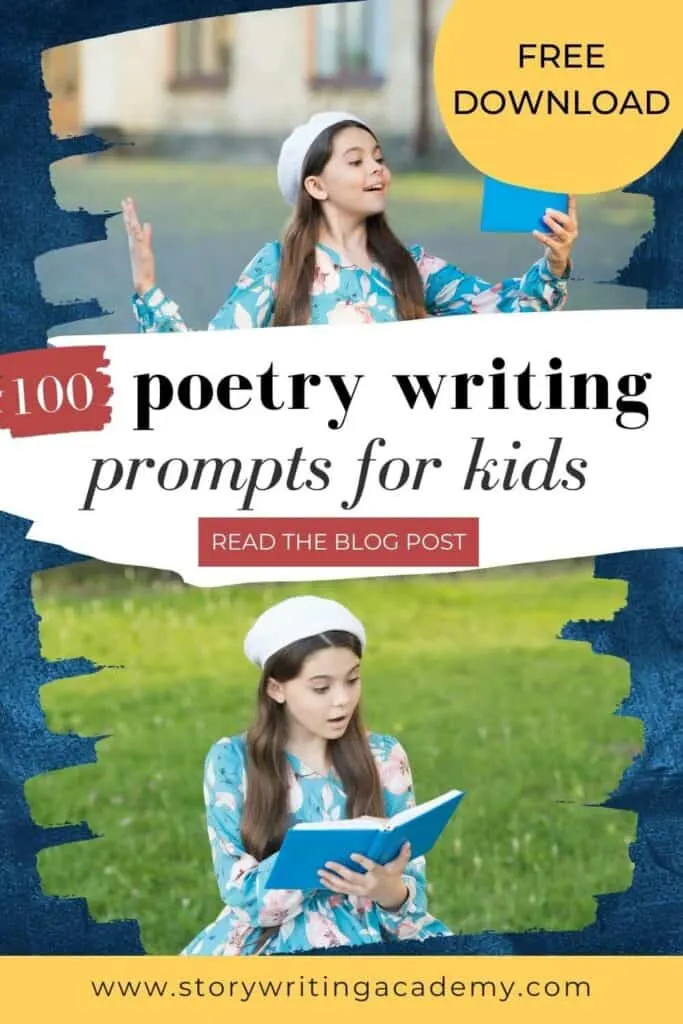
Why Kids Should Write Poetry
In our fast-paced world, many kids–and even their parents and teachers–may think poetry is a relic of a simpler time. They relegate it to an era that didn’t include Tik Tok, SnapChat, or Twitter (though perhaps some may consider the tweet itself a modern short poem).
In doing so, however, they miss out on a whole world of beauty and insight that poetry exposes us to. No matter the form, style, age, or tone of the poetry we read, it can transport us to other times and places, to other ways of thinking, living, and viewing the world.
Don’t we all need a little more of that these days?
Through poetry–both the reading and writing of it–we promote literacy and expand children’s ideas about how language works. (These literacy activities are another great way in which we can do that).
When we sit with a child and explain the use of syllables, rhymes, apostrophes, capital letters, punctuation, and word choice and order that we find in poems, it opens up new doors into language that may otherwise have remained shut.
As they read and write poems, their vocabulary expands, their reading fluency increases, their spelling improves, and they learn new ways of phrasing ideas. Reading poetry books with teens and younger kids opens their minds to the poetic possibilities available to them as writers.
Emotionally, kids experience growth through poetry when they read the experiences and insights of others and realize that they are not alone. They also learn to understand and express their own feelings in ways that feel safe to them.
And on top of all that, poetry is just plain fun. Coming up with rhyming phrases and funny limericks can just be a real hoot, especially when you give kids some time and space to play with their ideas.
April is National Poetry Month. Why not use that as a time to introduce or expand poetry appreciation and writing activities in your home, homeschool, or classroom?
Types of Poems Kids Enjoy Writing
While kids enjoy reading poetry of many types (as long as it’s well-written), there are a few key forms that will be easiest for them to practice their own poetry-writing skills on.
Rhyming poems
Many kids think their poems have to rhyme, and that’s not true at all. Many wonderful poems don’t rhyme or don’t have an easily recognizable rhyme scheme. If kids feel their poems need to rhyme to be any good, they may get overwhelmed by that challenge.
On the other hand, challenging oneself to come up with good rhymes can help a young writer overcome writer’s block as they try to make their pentameter and rhyme scheme work.
In a rhyme scheme, the sound of the syllable at the end of each line is represented by a letter. For example, if the first two lines end with box and fox, the sound “ox” would be designated by the letter A, and every line that ends in the ox sound (even if it is spelled “socks” as in socks or blocks) would also be represented by A. Each new ending syllable sound is represented by an additional letter.
Here are some popular rhyme schemes to introduce to children:
- AABB
- ABAB
- AAAA
- ABBA
- AAAB
- ABCB
Example of a rhyming poem with rhyme scheme AABAAB:
MIX A PANCAKE
CHRISTINA G ROSETTI
Mix a pancake,
Stir a pancake,
Pop it in the pan;
Fry the pancake,
Toss the pancake—
Catch it if you can.
If you want to dive deeper into different types of rhyme schemes with your students, read some of these rhyming books with them and analyze the various rhyming patterns used.
Haikus
A haiku is a three-line poem that describes something in nature. It typically has five syllables in the first and third lines and seven syllables in the middle line. However, if you like nerding out over stuff like this, check out this article to find out why the 5-7-5 rule for haikus is actually a myth.
No matter how many syllables you include in each of the three short lines, haiku poems work best when written with figurative language. Haikus offer a new way to have kids practice literary devices such as similes, metaphors, hyperbole, and personification. Challenge them to include at least one of these in their short poems.
Finding haikus for kids to enjoy is a perfect, unintimidating way to introduce them to poetry and different poetic forms.
Example of a haiku:
THE JUDGE UP HIGH
SOPHIE AGBONKHESE
When ice freezes stream
Heron flocks to his tree branch
A judge looking down
Acrostic poems
Acrostic poems are extremely fun for kids to write. Have them choose a title for their poem that is also the subject. For example, Bear or Christmas.
Have them write the word vertically down the margin of their page with each letter on one line.
Each line of the poem must then begin with the letter written on that line.
When read vertically, the first letter of each line should spell the title or subject of the poem.
Example of an acrostic poem:
BEAR
SOPHIE AGBONKHESE
Busting into my trash can
Eating everything he can find
A bear is living in my backyard
Raiding like a pirate
Limericks
Writing limericks with kids can be a hilarious undertaking, but you’ll probably have to write several together before they get the hang of it. My kids and I have had hours of fun over the years coming up with limericks.
A limerick is a witty, five-line poem with an AABBA rhyme scheme. It usually has a da-DUM da-da DUM da-da DUM rhythm.
Example of a limerick:
THERE WAS AN OLD PERSON
EDWARD LEAR
WHOSE HABITS
There was an Old Person whose habits
Induced him to feed upon rabbits;
When he’d eaten eighteen,
He turned perfectly green,
Upon which he relinquished those habits.
Free verse
Free verse poetry is a form that does not use strict rhyme and meter. It’s perfect for younger kids because it gives them the freedom to write whatever they feel like without worrying about rhyme schemes or syllables.
A popular type of free verse poem is the descriptive poem, in which the poet gives a detailed description of a person, place, animal, or inanimate object.
Example of a free verse poem:
NIGHT
SARA TEASDALE
Stars over snow,
And in the west a planet
Swinging below a star–
Look for a lovely thing and you will find it,
It is not far–
It never will be far.
How to Use Poetry Writing Prompts to Help Kids Write Poetry
The prompt ideas in this post are broken up into two sections. The first section are prompts, or ideas for poem topics. There are fifty of these prompts, separated into five categories.
The following section offers fifty poetry starters, or first lines, for poems. You can use these in combination with the topics if you like.
For example, you might have kids choose a writing topic AND a first line and combine them.
Start by having kids pick out a poem topic that inspires them or choose one at random. Then have them pick a first line, or again, draw one at random.
For an extra fun activity, you could have kids pick three cards:
- Type of poem
- Poem topic
- First line of a poem
Then have them combine these three elements to create their new poem. If they are writing a type of poem with a specific type of opening line, you’ll want to only offer them options that match their selection of poem type.
Prompts are just that: prompts. They’re here to spark ideas, not to be an end unto themselves. If they help children come up with their own poem topics and first lines, they’ve done their job.
You might also enjoy: 100 Creative Writing Prompts for Middle School
50 Topics to Write Poems About
Here are fifty poem topics to write about.
Poetry Prompts about Special Events
Write a poem about…
- How you met your best friend
- The day you got your pet
- A birthday party
- First day at a new school
- A historical event
- A recital or other performance
- An important sporting event
- The birth of your sibling
- Your favorite Christmas memory
- A field trip to a place you love
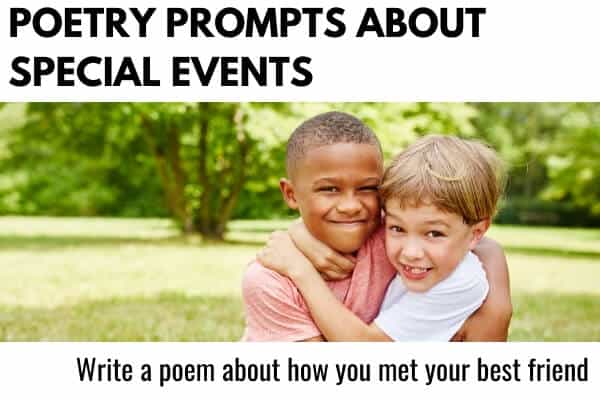
Poetry Prompts about Everyday Things
Write a poem about…
- The sound of your alarm clock in the morning
- A mishap at the breakfast table
- Taking a wrong turn and getting lost
- Having a sneezing fit in the middle of a test
- Your favorite food
- Taking care of a pet or a sibling
- How you feel about homework
- A strange dream
- A game (your favorite game or a made-up one)
- A present
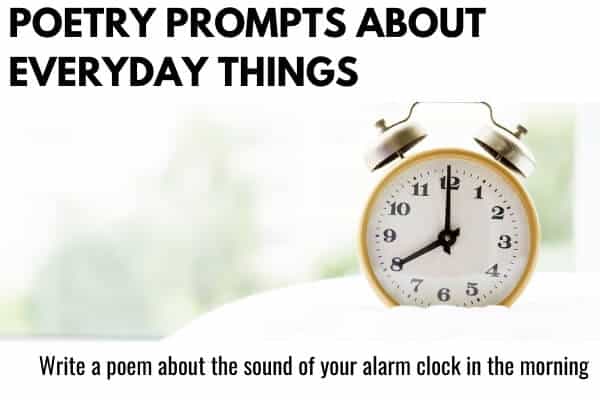
Nature Poetry Prompts
Write a poem about…
21. The first snowfall
22. An enchanted forest
23. A beautiful sunrise
24. Gardening
25. A spider
26. Your favorite animal
27. A river
28. Spring
29. Thunderstorms
30. The sun, moon, stars, or planets
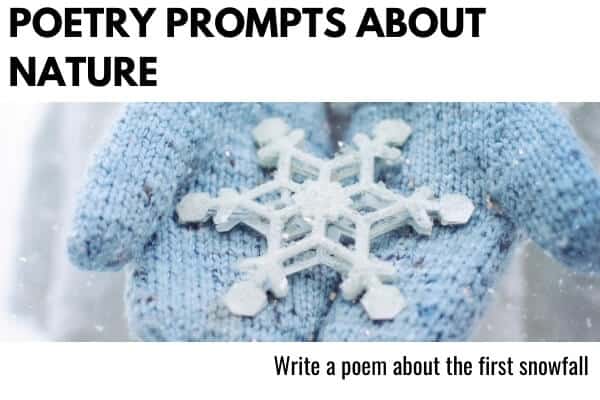
Write a Poem from An Unusual Perspective
Write a poem from the perspective of an inanimate object or animal, such as…
31. A pet
32. An article of clothing
33. A chair
34. A tree
35. The earth
36. A bird
37. A basketball
38. A spoon
39. A book
40. A cell phone

Poetry Prompts about People
Write a poem about…
41. A grandparent
42. A parent
43. An aunt or uncle
44. A teacher
45. Your favorite author
46. Your favorite musician
47. A friend you miss
48. An important historical figure
49. Someone you look up to
50. Yourself
You might also enjoy: How to Use Story Starters to Get Kids Writing

50 Poetry Starters for Kids
For some kids, seeing a list of topics to write poems about will be enough inspiration. Others might need a bit more encouragement.
Poetry starters are a great way to get the creative juices flowing. They offer a suggested first line for a poem so kids can jump right in.
Remember, the point isn’t to stick to a rigorous set of rules, but to inspire kids to develop an interest in poetry. So, if your kids pick a prompt and then decide to go in another direction, embrace that!
Note: some of the starters contain blank spaces. This is to allow for maximum flexibility in allowing the child to make the starter truly their own. If they can’t come up with anything, feel free to make some suggestions.
Have fun!
Haiku Poem Starters
Write a haiku using one of these first lines…
51. Bees buzz about flowers
52. Today, my heart leaps
53. What is ______? I asked
54. Snow slips down softly
55. Silvery sweet sound
56. Jump! And again: jump!
57. Through the trees, I go
58. Listen, hear her speak
59. Larger than a whale
60. Smaller than a mouse
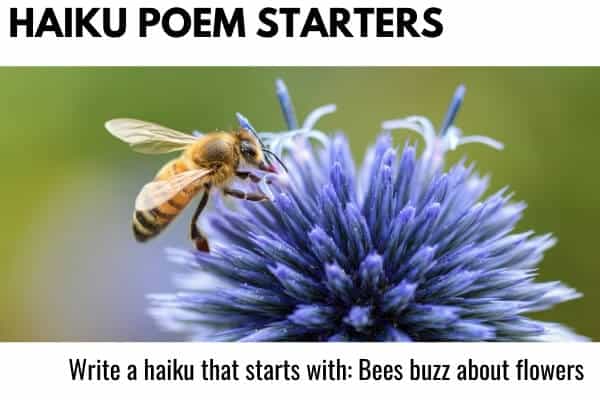
Limerick Poem Starters
Write a limerick using one of these first lines…
61. I woke up one morning with joy
62. It was quite a big day for me
63. It was the most embarrassing story
64. There once was a wise man who told me
65. If there’s one thing I can’t understand
66. What is that strange sound? I inquired
67. Most people forget I’m around
68. Did anyone ask what I thought?
69. The woman leaned down and said, “Here,
70. Let me tell you a story ‘bout how
Love writing prompts? Check out: The Big Book of Writing Prompts for Kids
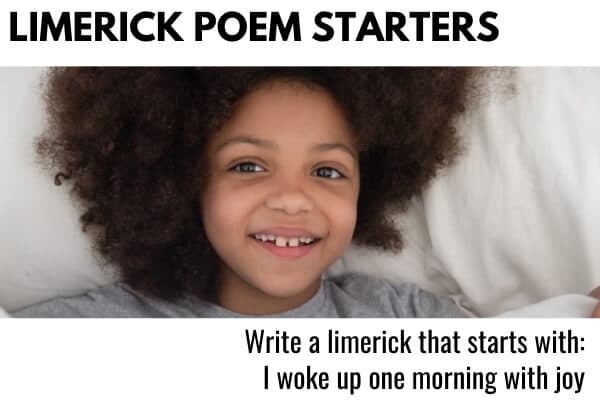
Funny Poem Starters
Write a silly poem using one of these first lines…
71. What is a ____(noun) to do?
When ____(pronoun) head is stuck in a shoe?
72. Oh, it might not have been quite so bad,
If it weren’t for my ____(adjective) dad.
73. Have you ever stuck your finger
too far up your nose?
74. Consider, I implore you,
what it’s like to be me
75. When spying, one must
Tiptoe with great care
76. Whatever you’re doing, drop it right now
Listen closely, I’ll make you say, “Wow!”
77. I met a funny little man
As I walked along one day
78. It’s not my favorite thing to do
I’d rather eat broccoli or step in glue
79. What do you do when you haven’t got a clue?
Where do you go when you see a crow?
80. If I found a hundred dollars, here’s what I would do
I’d grab my _____(noun), and my _____(noun), and my _____(noun) too.
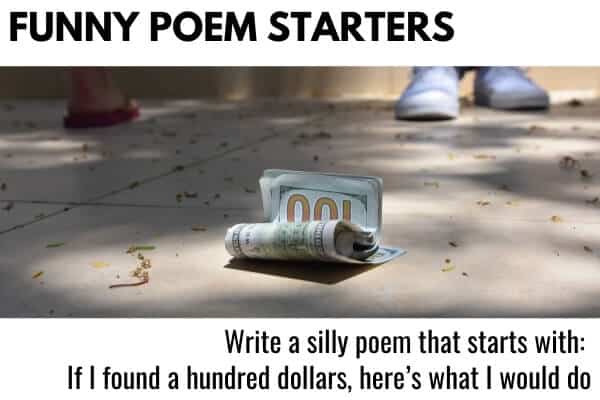
Rhyming Couplet Poetry Starters
Write a poem with A/B rhyme scheme using one of these first lines…
81. What do you see when you climb a tree?
Is there anywhere greater in the world to be?
82. Softly she sleeps, in midday sun.
Her afternoon nap, no time for fun
83. This story is strange, as soon you will see,
the weirdest thing, ever happened to me
84. In the spring, a flower grows.
One day it may become a rose.
85. As she pushed me on the tire swing,
my mother told me the most interesting thing.
86. Raise my binoculars up to my eyes,
zoom in on a figure, oh! What a surprise!
87. Whenever I sing a silly song,
whenever I daydream for too long,
88. I have this thing you have to see,
the latest, greatest technology.
89. Within the wrapping paper, brown,
the smallest gift I’ve ever found.
90. Creeping along the ground so slow,
onward, upward, off he goes.
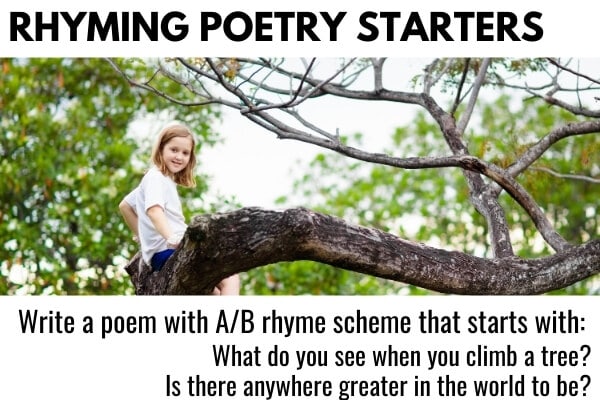
Free Verse Poetry Starters
Go in whatever direction you want with these free verse poem starters…
91. If I could do anything, here’s what I’d do…
92. Come see what I found, look real close…
93. Three things in this world, I can’t live without…
94. When winter snow begins to fade…
96. Look at the stars and name them all…
96. I found a ____ (noun) I thought I’d lost…
97. Whisper, whisper, tell me your story…
98. I dreamed a dream the other night…
99. At night, past my window, a tall ship sailed…
100. The greatest treasure you can find…
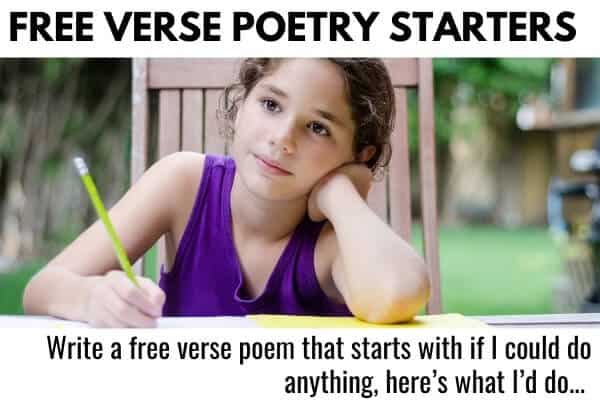
I hope you enjoy these poetry writing prompts for kids.
If you’d like an easy way to use them in your homeschool or classroom, enter your email below to receive a set of printable cards.
And don’t forget to check out all our other writing prompts and resources.
I hope that these poem ideas have inspired you to write some poetry with your children or students.
Leave a comment below and let me know which poetry writing prompts for kids you enjoyed the most (or share a poem!) and don’t forget to save this post to Facebook or Pinterest so you can find it later.

